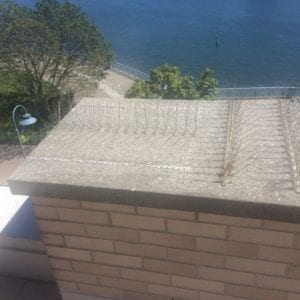
by Ryan Ponto | Sep 29, 2016 | Bird Netting
 The search is on for new owners brave enough to take it on haunted inn.
The search is on for new owners brave enough to take it on haunted inn.
The Three Pigeons Inn in Graigfechan, near Ruthin in Denbighshire , was originally a drovers’ alehouse and stead which has been on the site since the 12th century
It was rebuilt in 1777.
Today, the profitable property includes a lounge, bar and restaurant with two private ensuite holiday apartments, a lawned beer garden, outdoor veranda and beer terrace with a large car park and campsite – and around 1.8 acres of land.
The sale is under specialist business property adviser, Christie & Co and Keith Stringer, associate director at the company’s Manchester office, is handling the sale.
He said: “The Three Pigeons Inn is steeped in history and legend – even once hosting Owain Glyndwr, one of the most heroic figures in Welsh history and the last native Welsh person to hold the Prince of Wales title – as well as being home to a ghost or two, resulting in some strange sightings.”
The present owners, Paul Henri and Deborah Wilson-Henri, fulfilled a lifelong ambition in 2011 when they bought the Inn.
They have refurbished the property while maintaining original features that include open log fireplaces and beamed ceilings while also reviving the unique tradition of serving cask ales in jugs straight from the cellars.
About Pigeon Patrol:
Pigeon Patrol Products & Services is the leading manufacturer and distributor of bird deterrent (control) products in Canada. Pigeon Patrol products have solved pest bird problems in industrial, commercial, and residential settings since 2000, by using safe and humane bird deterrents with only bird and animal friendly solutions. At Pigeon Patrol, we manufacture and offer a variety of bird deterrents, ranging from Ultra-flex Bird Spikes with UV protection, Bird Netting, 4-S Gel and the best Ultrasonic and audible sound devices on the market today.
Voted Best Canadian wholesaler for Bird Deterrent products four years in a row.
Contact Info: 1- 877– 4– NO-BIRD (www.pigeonpatrol.ca)
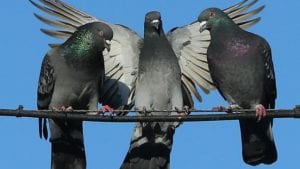
by Ryan Ponto | Sep 28, 2016 | Bird Netting
 I was reading a story in a magazine not too long ago that referred to eating pigeons. I guess back in the good old days eating pigeons or squab was as natural as eating quail or pheasant. I am glad that I did not get to participate in that ritual! I just don’t have an urge to dine on a pigeon.
I was reading a story in a magazine not too long ago that referred to eating pigeons. I guess back in the good old days eating pigeons or squab was as natural as eating quail or pheasant. I am glad that I did not get to participate in that ritual! I just don’t have an urge to dine on a pigeon.
I am sure that eating pigeons that live in the rural areas is not that bad. They feed on grain just like our other upland birds, so it is probably just like eating mourning doves. I just have these images of pigeons in parks in the cities and they do not look appetizing to me. I may not love to eat pigeons, but I sure do like to shoot them. Over the years, I have had opportunities to shoot the fast flying birds and it is quite a lot of fun. The hunts that took place were set up to eliminate birds that had become a nuisance on a farm. Pigeons are known for making a big mess!
There are other pigeons that I enjoy shooting, but they are made of clay. Shooting clay pigeons, or trap as it is called in shooting circles, is a hoot. Not only is it a great time, it is a fantastic way to keep your shotgunning skills honed. I got introduced to trap shooting my sophomore year at Kansas State University. The same guy that got me started dove hunting also encouraged me to tag along when he went trap shooting at the trap club west of Manhattan on Highway 24. I went with him on a Thursday evening shoot, and I was hooked. It also got me started in the shell reloading mode in order to keep up with the demand for all the shells I was going through.
Back during that time frame, there were trap shoots taking place in Sabetha out at the airport. I would come home occasionally during the fall, and there was usually a trap hunt that would attract a fair number of shooters. There were prizes such as hams or bacon for the winners and it was a great time. By the time pheasant and quail season rolled around, the shooting skills were honed to the point that misses on rising birds were rare. I was coming into Manhattan from the west on Highway 24 a couple of weekends ago and I drove past the trap range, which is still in operation. It brought back great memories and spurred me into action. Due to a lack of shooting opportunities over the years, I can promise you that my shooting skills have deteriorated.
Shooting trap is the perfect remedy for that problem. I plan on purchasing some birds this fall to plant and shoot so I know I need to do a little practicing. Sunday afternoon I gathered up my equipment, and my son-in-law and I headed outside to shoot a little trap. I pulled a Remington Wing Master 870 20-gauge pump to use as the firearm. Adam had never shot trap before, and I was anxious to let him have at it. I have a very simple clay pigeon thrower that tosses up to three targets at a time if you so desire. It was very inexpensive and does the job nicely. A box of clay pigeons is very cheap and contains 135 targets.
For sessions such as this, I use Estate shotgun shells, which are a cheaper shell to shoot if you are not reloading. For trap shooting, it is much more pleasurable to use the 20-gauge. It is more than adequate for the task and actually makes you a better shot. We got set up and began the session. Adam went first and he got himself set and smoked the first target. I was thrilled beyond words. It is not easy to just step up and shoot a shotgun and hit a flying target. We spent the next 45 minutes busting clay pigeons. It felt great to get back in the groove. I am telling you that smoking one of those fast flying clay targets is very satisfying.
No, you cannot eat one of these pigeons, but who really wants to eat a pigeon anyway? With the upland bird season on the horizon, get out there and shoot some trap and get back in the groove. It is a great feeling!
About Pigeon Patrol:
Pigeon Patrol Products & Services is the leading manufacturer and distributor of bird deterrent (control) products in Canada. Pigeon Patrol products have solved pest bird problems in industrial, commercial, and residential settings since 2000, by using safe and humane bird deterrents with only bird and animal friendly solutions. At Pigeon Patrol, we manufacture and offer a variety of bird deterrents, ranging from Ultra-flex Bird Spikes with UV protection, Bird Netting, 4-S Gel and the best Ultrasonic and audible sound devices on the market today.
Voted Best Canadian wholesaler for Bird Deterrent products four years in a row.
Contact Info: 1- 877– 4– NO-BIRD (www.pigeonpatrol.ca)
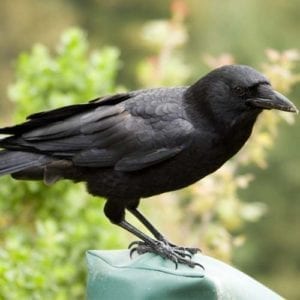
by Ryan Ponto | Sep 27, 2016 | Bird Netting
 A branch of McDonald’s has been closed in Hull and it appears to have had an unexpected effect on the city’s population of crows.
A branch of McDonald’s has been closed in Hull and it appears to have had an unexpected effect on the city’s population of crows.
People believe they are turning violent because they are unable to get their McDonald’s fix.
They claim the lack of scrap food is making the black pests more aggressive as they turn on themselves and other birds such as pigeons for nutrition.
The owner of one business at Kingston Retail Park in Hull said he found a dead pigeon which had been killed by crows.
Paul Rymer said: ‘We came into work one morning to find a pigeon all mangled and being pecked at by two crows.
A murder of crows is believed to be behind a slaughter of pigeons (Picture: SWNS)
‘They were both standing over it and we obviously scared them away.
‘When you get something like McDonald’s shutting for a few weeks it’s what happens, but there’s a lot of related problems down here with pigeon mess and litter that need to be sorted.
‘Something should be done about them.’
Other business owners believes that the crow problem, which includes an increasing number of the birds appearing, said issues with the animals pre-dates the fast food chain closure.
Phil Storey said: ‘It’s been pretty bad round here for a year now.
‘It’s a particular problem because of the litter. Nobody knows what a bin looks like these days.
They appear to have a penchant for McDonald’s
‘They seem to be attacking pigeons and each other. It’s not really putting anyone off coming down here, but it can be a bit intimidating for old people and children.’
Wildlife expert Tim Cockerill described crows as among ‘the most intelligent species’ around but said they did not generally feed on larger birds.
He said: ‘It’s quite likely that in this case the crows were scavenging on the pigeon rather than having killed it.
‘But they are very, very clever and if they see an opportunity to get something they will exploit it completely.
‘They don’t really cause any problems for humans, but there are other similar black birds that they get mistaken for, that can do.’
About Pigeon Patrol:
Pigeon Patrol Products & Services is the leading manufacturer and distributor of bird deterrent (control) products in Canada. Pigeon Patrol products have solved pest bird problems in industrial, commercial, and residential settings since 2000, by using safe and humane bird deterrents with only bird and animal friendly solutions. At Pigeon Patrol, we manufacture and offer a variety of bird deterrents, ranging from Ultra-flex Bird Spikes with UV protection, Bird Netting, 4-S Gel and the best Ultrasonic and audible sound devices on the market today.
Voted Best Canadian wholesaler for Bird Deterrent products four years in a row.
Contact Info: 1- 877– 4– NO-BIRD (www.pigeonpatrol.ca)
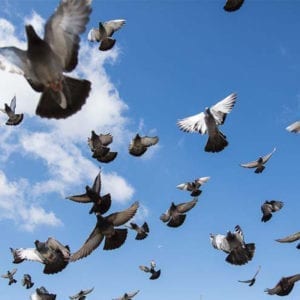
by Ryan Ponto | Sep 26, 2016 | Bird Netting
 Pigeons and planes. You might think that the two should avoid each other, but during the Second World War, the birds acted as crew members on the aircraft. To commemorate that at this year’s Rockton World’s Fair this month, organizer Bill Albers put together a special ceremony.
Pigeons and planes. You might think that the two should avoid each other, but during the Second World War, the birds acted as crew members on the aircraft. To commemorate that at this year’s Rockton World’s Fair this month, organizer Bill Albers put together a special ceremony.
“Pigeons were used in the war as well in Lancaster bombers and that’s how I decided to tie aircraft into the whole picture of pigeons and pigeoneers,” said Albers in an interview with the Flamborough Review.
The Cambridge resident said he wanted to do something to thank the veterans who liberated him and his family when they lived in Holland.
“I visited the (Canadian) Harvard Aircraft Association (CHAA) in Tillsonburg to try and get an idea if they would do a flyover and associated with the war effort,” he said, noting that although it was the second memorial presentation, this was the first time planes were involved.
Harvard trainers took to the sky in a formation and performed three flyovers – one with a smoke trail, one flyover and the missing man formation, in which one plane flies with a smoke trail and breaks away from the others.
“You know how hundreds of aircraft went over to Germany from England and sometimes one of them would get picked off by the Germans? That’s really what that separation indicated. You know, a fallen comrade or comrades.”
Albers noted he thought the veterans in attendance would appreciate the symbolism represented in the flyover.
During the presentation, he spoke to the crowd that included Dutch veterans from Ancaster and Dundas, a NATO vet, the 822 Tutor Squadron of the Royal Canadian Air Cadets and members of the Royal Canadian Legion.
He told them about how grateful he was and told stories about when he was growing up in occupied Holland – like having to eat “black bread” made of flour and sawdust and how the lack of food caused people to starve and resort to stealing.
He also recounted stories about the pigeons that helped the Allies to victory.
“When I saw probably 100 of our veterans…walking to Germany as prisoners of war, some barefooted so they wouldn’t run away, they walked 450 kilometres…that is etched in my mind,” said Albers.
On April 1945, when the First Canadian Army liberated his home country and brought in food supplies, Albers saw tanks and armoured vehicles that rolled into his town and women jumping on them to give the Allied soldiers hugs.
“It has a special meaning for me and I’ve always wanted to do something for the veterans,” he said, noting last year about 40 vets came to the event and were given special parking spaces and received a tour of the fair grounds.
“The vets appreciate the little bit of appreciation that we show and I’m reminded everyday of my freedom here in this country because of it,” Albers added.
Chris Kruter, a private in the Dutch army during the time when East and West Germany were being separated, said he enjoyed the presentation and loved to see the planes fly overhead. Kruter was among a group of Dutch vets from Dundas and Ancaster to be present at the service.
“That was great, you know, it’s special for the older generation,” he said.
Kruter, who grew up below the Rhine River, didn’t experience the hardships like those in the rest of the Netherlands, but did lose family members during the war. In May 1944, his father and sister were killed in a bomb raid. In September of that year, the First Canadian Army moved in and began liberating the country.
“Not until after I lost my dad. That is when…the hardship started,” he said, adding that he moved to Canada in 1965 and now lives in Ancaster.
It’s for these stories and for these vets that Albers felt compelled to hold a special presentation and one he hopes he can continue to present every year.
“For me it’s a great honour to honour the vets,’ he said. “I sometimes say, ‘It’s not about me, it’s about what the vets did’.”
About Pigeon Patrol:
Pigeon Patrol Products & Services is the leading manufacturer and distributor of bird deterrent (control) products in Canada. Pigeon Patrol products have solved pest bird problems in industrial, commercial, and residential settings since 2000, by using safe and humane bird deterrents with only bird and animal friendly solutions. At Pigeon Patrol, we manufacture and offer a variety of bird deterrents, ranging from Ultra-flex Bird Spikes with UV protection, Bird Netting, 4-S Gel and the best Ultrasonic and audible sound devices on the market today.
Voted Best Canadian wholesaler for Bird Deterrent products four years in a row.
Contact Info: 1- 877– 4– NO-BIRD (www.pigeonpatrol.ca)
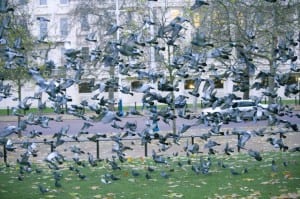
by Ryan Ponto | Sep 25, 2016 | Bird Netting

PIGEONS IN ST JAMES PARK TODAY
. REXMAILPIX.
Kites and pigeons have been banned in the areas around Benazir Bhutto International Airport and Noor Khan Airbase on the directives of the Pakistan Air Force.
Pakistan Air Force issued a draft to the police that kites and pigeons could disrupt the flights to and from the airport as well as the Air Force base.
CPO Israr Abbasi also released orders to the police to ensure strict implementation of the directive. Pigeon cages were also removed from rooftops in the locality.
About Pigeon Patrol:
Pigeon Patrol Products & Services is the leading manufacturer and distributor of bird deterrent (control) products in Canada. Pigeon Patrol products have solved pest bird problems in industrial, commercial, and residential settings since 2000, by using safe and humane bird deterrents with only bird and animal friendly solutions. At Pigeon Patrol, we manufacture and offer a variety of bird deterrents, ranging from Ultra-flex Bird Spikes with UV protection, Bird Netting, 4-S Gel and the best Ultrasonic and audible sound devices on the market today.
Voted Best Canadian wholesaler for Bird Deterrent products four years in a row.
Contact Info: 1- 877– 4– NO-BIRD (www.pigeonpatrol.ca)

 The search is on for new owners brave enough to take it on haunted inn.
The search is on for new owners brave enough to take it on haunted inn.

 I was reading a story in a magazine not too long ago that referred to eating pigeons. I guess back in the good old days eating pigeons or squab was as natural as eating quail or pheasant. I am glad that I did not get to participate in that ritual! I just don’t have an urge to dine on a pigeon.
I was reading a story in a magazine not too long ago that referred to eating pigeons. I guess back in the good old days eating pigeons or squab was as natural as eating quail or pheasant. I am glad that I did not get to participate in that ritual! I just don’t have an urge to dine on a pigeon.
 A branch of McDonald’s has been closed in Hull and it appears to have had an unexpected effect on the city’s population of crows.
A branch of McDonald’s has been closed in Hull and it appears to have had an unexpected effect on the city’s population of crows.
 Pigeons and planes. You might think that the two should avoid each other, but during the Second World War, the birds acted as crew members on the aircraft. To commemorate that at this year’s Rockton World’s Fair this month, organizer Bill Albers put together a special ceremony.
Pigeons and planes. You might think that the two should avoid each other, but during the Second World War, the birds acted as crew members on the aircraft. To commemorate that at this year’s Rockton World’s Fair this month, organizer Bill Albers put together a special ceremony.
